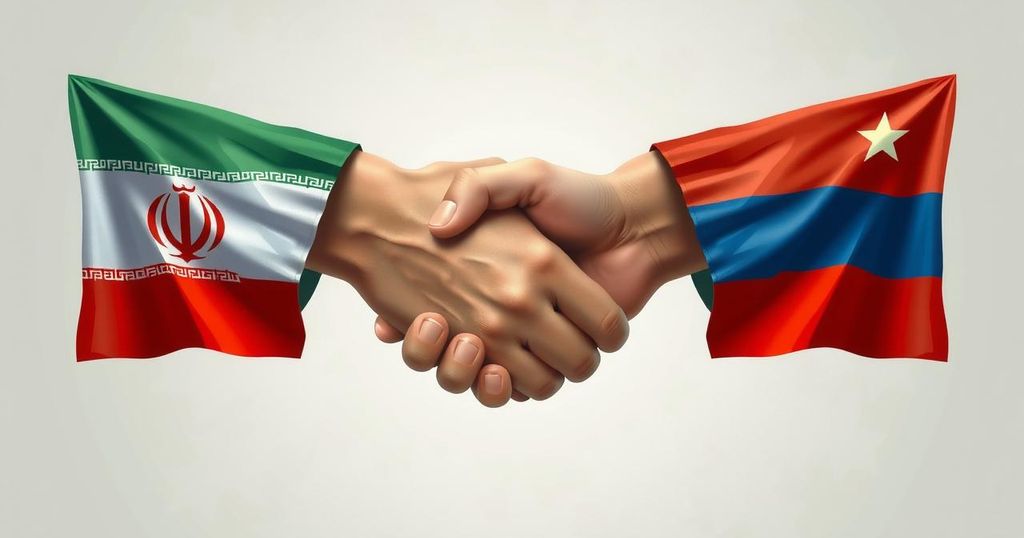Experts warn that the increasing military cooperation among Iran, China, and Russia presents a significant threat to the US and Israeli security, particularly following recent naval drills in the Gulf of Oman. This collaboration is seen as enhancing their compatibility and operational readiness in potential conflicts, especially related to Iran’s nuclear program and its regional influence. The ongoing situation merits close observation and strategic response from Western countries.
The ongoing military collaboration among Iran, China, and Russia escalates the threats faced by the United States and its allies, particularly Israel, as highlighted by experts interviewed by The Algemeiner. Recent naval drills, titled Maritime Security Belt 2025, were conducted within Iranian territorial waters, emphasizing defense cooperation amidst rising tensions linked to Iran’s nuclear ambitions and its support for regional proxies.
The drills, which mark the fifth joint exercise since 2019, occurred in a crucial area near the Strait of Hormuz—a vital corridor for global oil transportation. Research analyst Jack Burnham from the Foundation for Defense of Democracies noted that such drills enhance interoperability among the three nations, enabling them to respond effectively to potential regional crises and foster further military cooperation, including the transfer of advanced military technologies.
The Iranian Navy has reportedly engaged warships from both the Chinese and Russian navies, with involvement from Iran’s military forces, including the Islamic Revolutionary Guard Corps. Rear Admiral Mostafa Tajeddini emphasized the exercises aimed to bolster security and enhance multilateral collaboration in the region, underscoring that joint operations could lead to improved maritime security in the Indian Ocean.
International observers from several nations including Azerbaijan, South Africa, and Pakistan monitored the drills, highlighting the geopolitical implications. The Chinese Defense Ministry stated the drills aimed to build military trust and cooperation, involving simulations of maritime strikes and coordinated search and rescue operations.
China and Russia continue to strengthen their economic and military ties with Iran, with Beijing maintaining its oil purchases despite sanctions and Moscow utilizing Iranian drones in the ongoing conflict in Ukraine. According to John Lee from the Hudson Institute, military cooperation has grown over the last five years, indicating an alignment of interests to counter U.S. influence.
Lee noted that tactical exercises with a focus on maritime operations could serve as preparations for future conflicts involving the U.S. and its allies. He also commented on the critical nature of choke points such as the Persian Gulf, emphasizing that deepened ties with Russia and China could enable Iran to enhance its maritime influence.
Iran’s burgeoning relationships with these nations unfold amid intensifying sanctions targeting its oil sector as part of the U.S.’s maximum pressure campaign to deter nuclear development. The International Atomic Energy Agency raises concerns over Iran’s expedited uranium enrichment, increasing fears of military capabilities despite Tehran’s claims of peaceful intentions.
The UN Security Council’s recent discussions on Tehran’s nuclear program emphasize the urgency of monitoring Iran’s compliance with nuclear regulations. In response to heightened U.S. pressure, Iranian leaders like Ayatollah Khamenei and Foreign Minister Abbas Araghchi have rebuffed direct talks with the U.S., showcasing Tehran’s commitment to its current trajectory. Meanwhile, a meeting in Beijing among Iran, Russia, and China concerning the nuclear issue reflects the strengthening of their trilateral relations.
The deepening military ties among Iran, China, and Russia pose substantial threats to the United States and its allies in the region, especially Israel. Joint military exercises improve interoperability and operational experiences among these nations while heightening the possibility of arms transfers that could empower Iran and its proxies. Moreover, ongoing developments concerning Iran’s nuclear activities further complicate the geopolitical landscape, necessitating vigilant monitoring and potential diplomatic negotiations to mitigate risks.
Original Source: www.algemeiner.com






